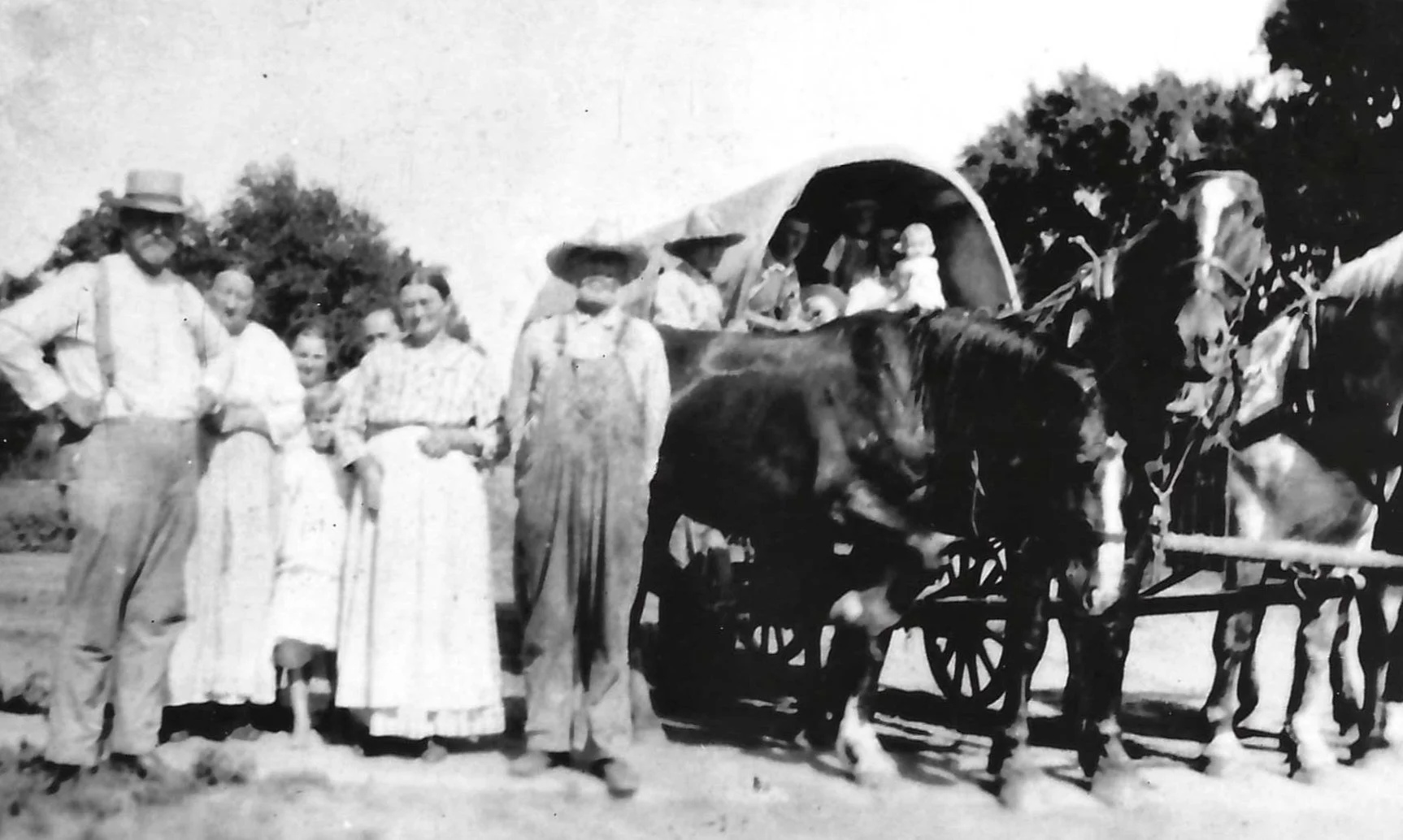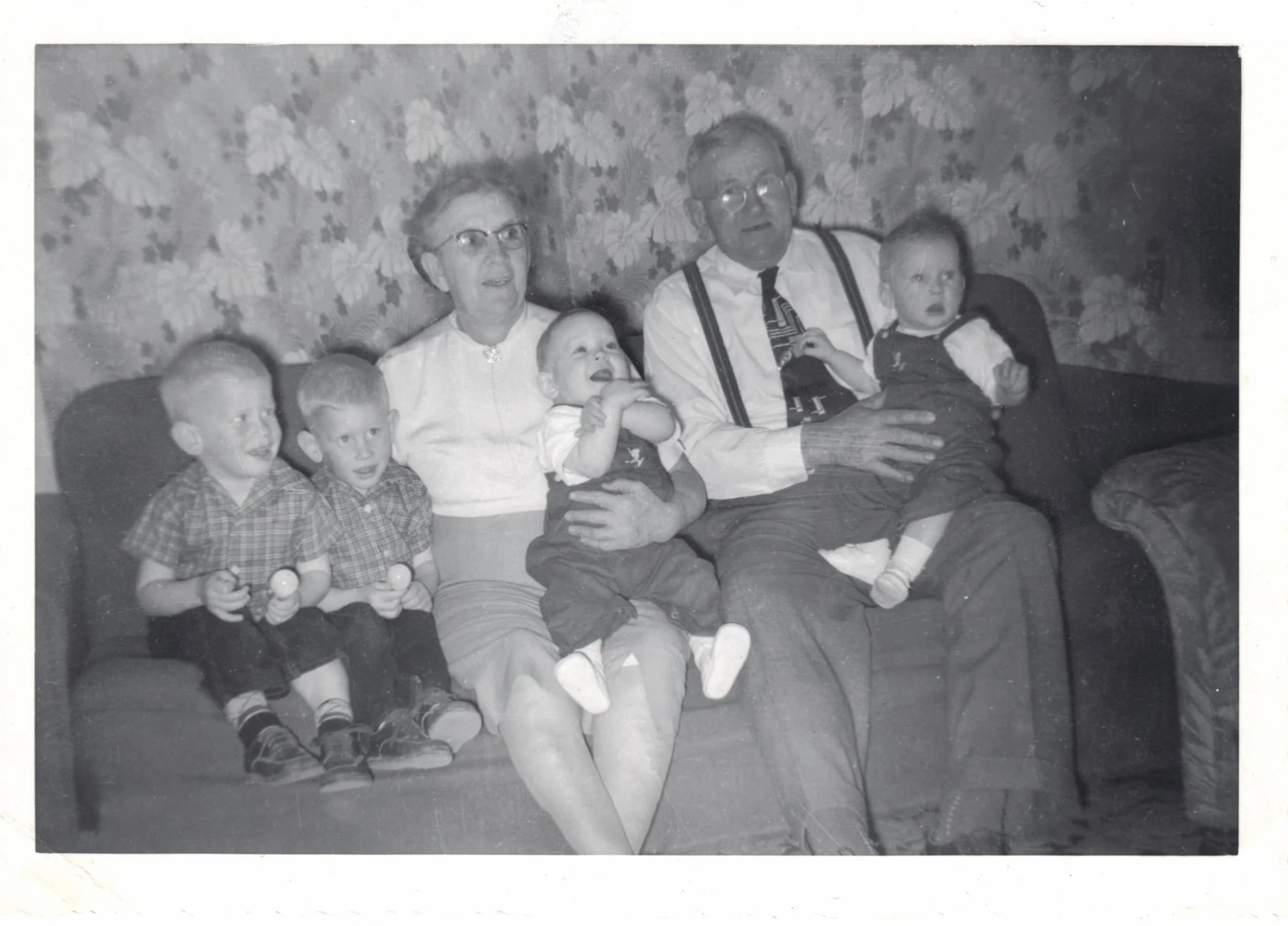Lessons from my grandmother
My grandparents are in this covered wagon with their three young children. It’s hard to see, but my grandmother is holding a baby. That's my dad! Standing next to the wagon are friends and relatives that helped them pack.
When I looked through my dad’s files after he died, I found my grandmother, Katherine Prieb’s, written account of traveling for eight days by covered wagon with her husband, John, and their three young children, all under the age of 5. In 1922, my dad was 8 months old when his parents decided to move from Hillsboro, Kansas to Inola, Oklahoma where they had purchased a farm. I had heard this story many times, but finding and reading my grandmother’s written words of this journey was an unexpected treasure. My edited and condensed version of her story follows.
The original plan was to transport the family along with two teams of horses, a cow, furniture and farm implements by train. A summer day begins with men loading a freight train car scheduled to leave that afternoon for Oklahoma. Katherine wrote, “We had (everything) loaded in the train car except for the livestock and were going to eat at Mother’s house in town and then load the livestock, when the depot agent came running and informed us they could not allow any livestock to go along and have it insured for landing at its destination because of a strike coming up. So what now.”
How stressful it must have been to hear this news at this late hour. Someone quickly made the suggestion to travel by a covered wagon. My grandmother continues, “So everybody looked for different things that we must take with us on our trip; others helped to find a tarp to cover the wagon; others thought of feed for the horses and a water trough at the back of the wagon; and what all else, like a one-burner oil stove and a can of kerosene, a box of small potatoes, a cured ham, a jug of water. How we managed to get all that arranged within four hours, I don’t know. But we left that afternoon late.” Grandmother also mentioned that they had to “shoe the horses in order to walk on the pavement where we could not avoid it.”
The second night of the trip, a dark storm cloud appeared, so the family got permission from a nearby farmer to shelter in their old empty farm house. Belongings and food were moved out of the wagon so they wouldn’t get wet. Unfortunately, the vacant old farmhouse turned out to be a “rathole” with rats running on the floor as the children slept on the floor with the family’s food box. My grandmother was not happy.
But then, the next day was idyllic and peaceful. At noon, they “came to a bridge where they could see clear running water along the creek bed so we could park along the road side, unhitch the horses and let them rest and drink their fill and the children could cool off in the clear water. I cooked some potatoes with jackets on our little cook stove and washed diapers in a bucket; also I had somehow gotten some homemade soap which helped to take the stain out of diapers. The barbed wire fence was a good clothesline for hanging up our clean washed things in the hot sunshine after the clouds disappeared and we sought the shade of the bridge.”
But tragedy was soon to follow. Continuing on their journey, they came to a bridge with a sign, “condemned for heavy loads.” The weight wasn’t a problem, but the bridge was in bad shape. After crossing the bridge, my grandfather noticed one of the horses had trouble keeping up with the other three horses. So, my grandfather unhitched the horse and led it while walking behind the wagon. A short distance later, the horse could go no further. Then, alarmingly, the horse fell over “board flat” in the middle of the pavement. It became apparent that the horse had stepped through a plank and caught a spike through the side of his hoof. People came by and offered to help but no one knew what to do. “One lady tried to offer smelling salts but no results. Another lady offered to send a vet out.”
Then, to their dismay, the horse just stopped breathing. My grandmother wrote, “A farmer came by and offered to help get the dead horse off the road. He took my husband along to the nearest farmer who came back with a wagon pulled by two horses, and they dragged the dead horse into the farmer’s pigpen.” (Picturing the pigs snacking on their beloved horse unsettles me every time I read it.)
While waiting, my grandmother quickly fixed a little supper to eat; they wanted to leave before the vet would show up. “Before we got our stuff back into the wagon, the vet was there. The dead horse was gone, but they insisted we had to pay them mileage. That really hurt. From there on our traveling was with a heavy heart. But we thanked God we still had enough horse power with three horses and did not have to buy one to finish our journey.”
My grandmother continues, “When we came closer to Tulsa, Oklahoma, we watched the names on the mailboxes since we were acquainted with some people there. About 11:30, we saw a familiar name. We knew we had to have some drinking water for our horses. So we turned in and those people were so kind to us. They were almost ready to have dinner and I was just about played out from heat and not enough water. Wes (my dad) had been crying almost the whole trip unless he was asleep. Why I don’t know. He was still nursing and only eight months old. When we left the farm house we knew we had only one more night to spend in the wagon. We were all looking forward for the end of our journey. We could hardly sleep that night.”
“So early before sunrise we were on our last day of our trip.” It was another hot and humid day, and my grandmother writes that she “was starting to feel one of those nasty headaches coming up so when we got to Inola that day at noon, John got me a few oranges so I should last until we got to our brother’s place.” When they finally arrived, Katherine tried to forget her misery by lying down and resting before collapsing. She wrote, “After noon, the men folks went to town to start unloading the freight car. There was much to repair. Someone brought glue and whatever else was needed to mend dresses and wardrobes and such things and before evening we were at our new home for a first night rest after spending eight days on the wagon on the road.”
The farm my grandparents purchased in Oklahoma turned out to be near a creek bed that regularly flooded, and unfortunately they had to give up the farm. The family eventually returned to Kansas.
My grandparents faced many challenges, yet they gifted their children and 18 grandchildren with a rock solid foundation of faith. They were examples of faith in the midst of adversity. Rereading my grandmother’s story once again, what struck me this time was how often she mentioned where they found drinking water. Traveling on hot summer days, it was crucial that they find clean water daily for their horses and themselves. And they did. My grandmother’s story offers a lesson every time I read it.
Take it or leave it suggestion #19: Write down a family story and keep it in a file.
Years later, my two grandparents were blessed with two sets of twins born to two daughters within two years.

